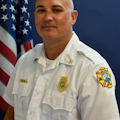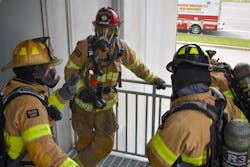Company officers are the most influential people in the department. They can have a positive and negative effect on their crew and agency. The amount of influence that they have depends on several attributes.
If these people are a can-do type of boss, their attitude will be contagious among their crew members. However, if the boss is one to be lazy, procrastinate and complain, you can expect that type of influence among the crew and this negative effect to spread throughout the department.
More times than not, when company officers display negative behavior toward their position, department or coworkers, it’s a cry for help that’s based on insecurities.
Further, the newly promoted company officer must be willing to do more work, not less. (If a promoted member is looking for less work, that individual is in the wrong business.) Good company officers put in long hours from time to time to help to prepare their crew and themselves. Company officers who fail to prepare will fail to lead when the tones drop and it’s time to respond to the next big call.
The company officer’s work is constant and has different layers, including experience, knowledge, guidance, coaching, time management, personnel issues and passion for the job.
Experience
Most will question whether they have enough experience to become a company officer. Very often, the answer is no. However, we have no control over the time lapse, calls and how we gain experiences along the way in our career.
The most important influence that the company officer has during the experiences that are gained—whether good or bad—is sharing them with others. Growth in terms of officer prowess happens at these moments. Experiences must be shared at all levels, so everyone learns from them. This is vital for new and senior officers.
Knowledge
The more that company officers share their experiences, the more on-the-job knowledge that they can gain. That said, knowledge must go hand in hand with practical application.
All company officers must be a student of the job to obtain and retain the knowledge that’s required. One might know how to recite or tabletop drills, but putting knowledge to work on the fireground effectively is the only way that this is reinforced. This also sets an example for other company officers and crew members.
Guidance
Whether company officers realize it or not, the guidance that they offer during their career paves the road for their crew members, and paving that road provides a feeling of accomplishment.
Company officers who have that motivated crew or crew member who they influenced must continue to feed that horse. Creating firefighters who want to accomplish what their company officers accomplished by placing that bugle or bugles on their collar leads to a greater level of influence. Firefighters, who company officers had a hand in helping to promote to the next level, have a greater influence throughout the department and affect others at a higher level. This starts to cultivate new and senior company officers as they start to watch the transition take place.
Guiding firefighters through the steps of gaining knowledge and experience sets them up for a pathway to success. Ultimately, this creates a bigger effect on the entire mission of the department, which, in turn, provides a better service to the citizens who the department protects.
Coaching
Believe it or not, company officers coach their crew members. As the head coach of their team, company officers don’t get many days off. Successful coaches must prepare well, and preparation is the key to success or failure.
Company officers must keep their crew prepared mentally, physically and tactically. Failing to do this could be catastrophic to not only the community that the department protects but to the crew as well.
Being mentally prepared each day translates into being physically and tactically prepared. Given the distractions in everyday life, being mentally prepared is vital prior to and during the shift.
There are similarities between firefighters and athletes—for example, the very athletic, game-changing quarterback who is the leader of the team—when it comes to coaching and mental preparation. If that quarterback isn’t mentally strong and is rattled easily, that person’s performance will suffer and be detrimental to the team. It’s the same for company officers and their crew members.
Being physically prepared is mandatory. Company officers must keep their crew members in great physical shape.
Preparing tactically is a constant evaluation. Company officers not only must maintain tactics in day-to-day operations but must continue to study, attend conferences and classes, research and evolve along with the fire service.
Time management
Time management is arguably one of the most challenging things to learn for new or senior company officers. Time management is never on our side. We are one phone call away from disrupting the game plan for the day.
Company officers must learn to prioritize their time and evaluate what they want to accomplish each day.
When I was a newly promoted company officer, I believed that the more that I accomplished, the more productive we were as a crew. As I learned to prioritize my shift more, I noticed a lot more productivity in my crew when fewer “checklist” items were accomplished. Our day was prioritized around training and physical fitness—the utmost important things outside of running 9-1-1 calls. We learned as a crew that all station duties would get done in time and not to make them our priority for the day.
This must be evaluated on a regular basis. Good company officers learn to tap into their resources and influence their crew members to help them to prioritize the shift daily as well as to remain open to suggestions to make the best use of the crew’s time.
Personnel issues
Crew members require company officers’ time, and, yes, company officers owe that to them.
The one thing that most of us learned from on-the-job experiences is how to—or how not to—handle personnel issues. Unfortunately, company officers will have these issues arise from time to time.
The way that company officers handle themselves and the things that they choose to address or to not address has a huge influence on their crew.
Firefighters generally want to work for someone who is willing to be fair and consistent and to hold them accountable. Newly promoted officers will find this challenging periodically. Nevertheless, they must be willing to have difficult conversations with their crew members when those members aren’t cutting the mustard.
To keep it simple, have clear expectations, know your people, treat them with respect and hold them accountable. Remember, what you allow outside of your expectations is your new standard.
Passion for the job
One of the most important ways for company officers to influence crew members is exemplifying passion for the job. This is demonstrated daily by how company officers carry themselves and handle their business throughout the day.
It’s OK to be into the job and to get excited about the fire service. Keep that passion and desire to learn. Most of us got into this job because we absolutely loved it. However, we all have different passion levels. Sometimes, we must reach outside of our comfort zone to reignite that passion.
Surround yourself with like-minded people, set goals, and attend conferences and training. Encourage crew members and coworkers to attend fire conferences and outside training. Don’t get bogged down in the things that you can’t control, to avoid spending long hours ruminating on them at the kitchen table. A well-seasoned fire chief once said, “Don’t be a tabletop consultant, but, better yet, be the change.”
Responsibility to motivate
Control your circle by influencing your crew members to achieve high-level success. There is no greater reward than that—whether through the ranks or performance on scene. As a company officer, you hold major influence throughout the entire department.
About the Author

Chris Kidder
Chris Kidder began his fire service career in 2002. His journey at South Walton Fire District (SWFD) in Santa Rosa Beach, FL, began in 2005 as a firefighter/EMT. In 2008, Kidder obtained his Florida paramedic license. In 2012, he was promoted to sergeant/paramedic and then rose to the rank of lieutenant/paramedic in 2015. Kidder was promoted to district chief in 2019 and currently is assigned to A-shift. He is an active member of the SWFD Technical Rescue Team. Kidder holds an Associate in Science degree in emergency medical services. He teaches at Northwest Florida State College as an adjunct fire instructor. The certifications that Kidder holds include Critical Care Emergency Medical Transport Program, International Trauma Life Support Instructor, Fire Officer I, Fire Officer II, Instructor I, Live Fire Training Instructor II and pump operator.
